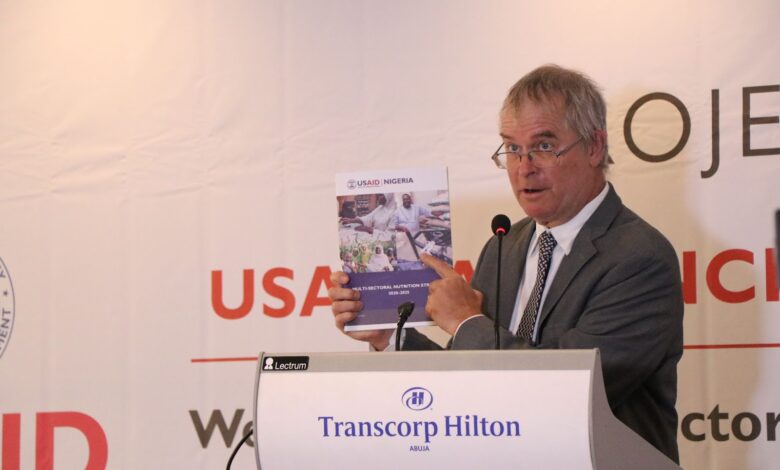USAID Initiates $9.5M Nutrition Activity To Improve Malnutrition In Northwest Nigeria
The advancing nutrition activity was mainly launched by USAID to identify malnutrition in most vulnerable populations especially in Children, adolescents, and women in Northern states.

The United States Agency For International Development (USAID) has launched a two-year $9.5 million Advancing Nutrition Activity to fight against malnutrition and improve nutritional wellbeing of citizens in Kebbi, Sokoto, and Bauchi states.
The international agency said food insecurity and malnutrition represent a critical public health concern in Nigeria that has sustainably affected the economic growth and productivity in most populations.
“Malnutrition has a far-reaching impact on the most vulnerable populations, especially children, adolescents, and women,” Paul McDermott, USAID Health, population, and Nutrition Office Director said.
Malnutrition in Nigeria
Malnutrition is largely concentrated in Nigeria’s northern states due to close association with poverty which predisposes people to poor food consumption, poor access to water, sanitation and hygiene (WASH) services and facilities, food insecurity due to poor access to land and livelihoods in some areas, and population displacements and insecurity limiting the delivery of humanitarian aid.
The 2018 Nigeria Demography and Health Survey also highlights that stunted children is largely concentrated in the Northwest at 57 per cent and by state, Kebbi has the highest incidence of malnutrition at 66 per cent.
In addition, the proportion of children who are wasted – where a child is too thin for their height and is the result of recent rapid weight loss or the failure to gain weight – is approximately twice as high in the North-east at 10 per cent and Northwest at 9 per cent.
According to a report by Integrated Food Security Phase Classification, over 1.7 million children under the age of five are expected to suffer from acute malnutrition in the Northeast between Sept. 2021 and Aug. 2022.
“With nearly 614,000 severe acute malnutrition (SAM) cases and over one million moderate acute malnutrition (MAM) cases. In addition, over 151,000 pregnant and lactating women will likely be acutely malnourished and are in need of nutrition interventions,” the report said.
The United States Agency For International Development (USAID) spotlighted that food security and nutrition can be attained through coordinated multi-sectoral, private, and public sector programming, including agriculture and environment: water, sanitation and hygiene health, education, and governance.
The report also highlighted the USAID/Nigeria Multi-sectoral Nutrition Strategy that will identify the underlying causes of malnutrition, provide technical support, share innovations, and conduct research to improve nutritional outcomes.
Support Our Journalism
There are millions of ordinary people affected by conflict in Africa whose stories are missing in the mainstream media. HumAngle is determined to tell those challenging and under-reported stories, hoping that the people impacted by these conflicts will find the safety and security they deserve.
To ensure that we continue to provide public service coverage, we have a small favour to ask you. We want you to be part of our journalistic endeavour by contributing a token to us.
Your donation will further promote a robust, free, and independent media.
Donate HereStay Closer To The Stories That Matter




